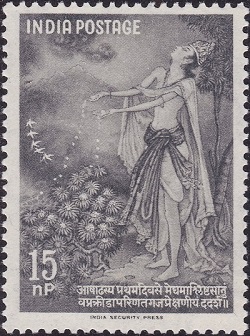Messages and messengers
Messages and messengers
Meghaduta is a lyric poem written by Kalidasa (c. 4th–5th century CE), considered to be one of the greatest Sanskrit poets. It describes how a yaksha, who had been banished by his master to a remote region for a year, asked a cloud to take a message of love to his wife. The poem become well-known in Sanskrit literature and inspired other poets to write similar poems (known as messenger-poems or Sandesha Kavya) on similar themes.

A poem of 120 stanzas, it is one of Kalidasa’s most famous works. The work is divided into two parts, Purva-megha and Uttara-megha. It recounts how a yaksha, a subject of the king Kubera, after being exiled for a year to Central India for neglecting his duties, convinces a passing cloud to take a message to his wife at Alaka on Mount Kailasa in the Himalaya mountains. The yaksha accomplishes this by describing the many beautiful sights the cloud will see on its northward course to the city of Alaka, where his wife awaits his return.